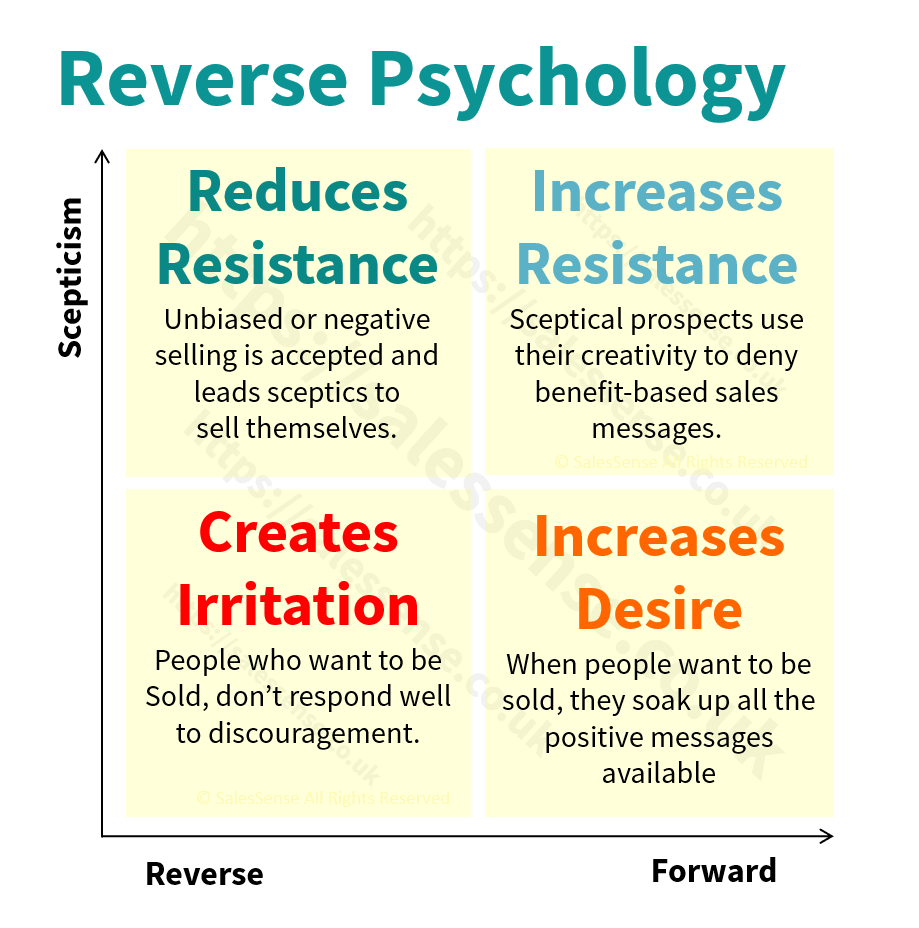On-the-job actions for influencing people while developing persuasion skills.

Use the workplace actions below to increase sales effectiveness while improving persuasion skills:
- Change people's minds.
- Get help, time, and resources from other people.
- Persuade people to do things that they do not want to do.
Take these actions to change another person's mind about something:
As suggested elsewhere, research the person's nature.
Look the person up online and glean as much information about their likes and dislikes, preferences and personality, abilities and knowledge as you can.
In conversation, learn how the person makes decisions differently from the way you make decisions.
Ask how they came to have their current job, position, or project.
Encourage a full response by asking, "And then?" or "What led to that?"
Ask what they are working on right now and what difficulties they have had to overcome.
Encourage a full response by asking "How did you deal with that?"
Use confirmations like, "It sounds like that is important to you" or "You seem passionate about that issue" or "You seem to know a lot about that" to confirm your sense of this person's motivations, ambitions, and passions.
After less than ten minutes you should have a good idea of how the person's self-image, thinking and decision-making differs from yours.
When you know enough, use your imagination to put yourself in the person’s head and use what you have learned to understand how their self-image, motivations, ambitions, and passions bear on the issue that you want to change their mind about.
Perceive the issue from their perspective. Sense their feelings and anticipate their likely leanings and decisions concerning the issue.
Now intuit the reason that will change their mind. Put the right reason forward as a rhetorical question such as, "I suppose you have considered . . ."
Then let the question sink in. It takes patience. It might take days however, if you have found the right reason and refrained from over-promoting it, adoption is inevitable because the reason for changing their mind will be their own.
- Practice these things often to improve your ability to step into another person's shoes, look out through their eyes, and sense their feelings.
These articles offer further ideas:
These actions increase access to resources including money, advice, and people's time:
Do something for the people that you need help from.
Repay a favour, bring a gift, or just find a way to make them feel good about themselves. Demonstrate reciprocity so that they will know that you repay favours. Small courtesies are better than grand gestures.
Ask for what you need when you need it or very close to the time when they will need to take action and make it clear that they are the only person who can help.
Create a sense of legitimate urgency that is circumstantial and not due to any fault or incompetence on your part.
Ask for something much greater than the person is likely to give.
Most people feel bad when they have to say no and so will be predisposed to agree to a lesser request. Accept the first rejection graciously and then ask for what you really need.
These articles offer further ideas:
Take these actions to have someone do something they do not want to do:
Use a combination of the actions described above together with an understanding of the reasons that people do things to find the right approach for almost every situation.
People do things because:
- They think it will help achieve important goals or objectives
- They are asked by someone who has done things for them
- They feel a sense of duty to do what is asked
- They feel that not doing a thing would be letting others down
- They are asked by someone with whom they have a strong or important relationship
- They feel the action is in accordance with their self-image or beliefs
- They feel they might be missing out
- They think it will be interesting
Our actions are driven by our dominant internal motivators.
You can probably recognise yours from the following list:
- Position - Doing things to gain a higher position to fulfil ambition or gain influence
- Money - Doing things to increase financial independence
- Achievement - Doing things to reach personal goals and objectives or to fulfil dreams
- Duty - Doing things because they are expected to be done or perceived to be a duty
- Recognition - Doing things to have people acknowledge contribution, effort, or results
- Safety and Security - Doing things to feel safe, secure, and certain of the future
- Autonomy - Doing things to maximise freedom and liberty
- Life Balance - Doing things to protect personal or family time
- Relationships - Doing things to retain goodwill, develop friendships, and maintain associations
- Interest - Doing the things that are personally inspiring or exciting
- Challenge - Doing things because they are difficult or because few others have succeeded
More ideas for changing peoples' minds:
Get the entire collection of over 100 hyperlinked on-the-job sales skills' development actions together with our sales skills assessment in a neat indexed PDF document.
If you need to develop persuasion skills or start a performance improvement programme, we can help. Telephone +44 (0)1392 851500. We will be pleased to discuss your needs or talk through some options. Alternatively, send email to custserv@salessense.co.uk for a prompt reply or use the contact form here.












